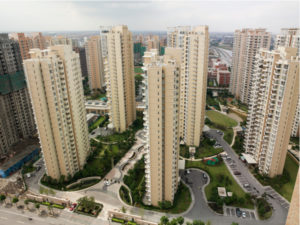
The sad story of individuals’ lives being ruined by the Evergrande debt crisis is nothing new when it comes to investing horror stories. From Andy Kessler’s article “Will China Save Evergrande?” in the WSJ.
Kessler writes:
Is China about to get a lesson in “Too Big to Fail?” Its second-largest real-estate developer, China Evergrande Group, with 1,300 projects in 280 cities, has some $300 billion in liabilities. Evergrande owes investors as many as 1.6 million unfinished apartments, and as far as financial debt, it owes $88.5 billion to banks and bondholders with $37 billion due within a year. It already missed an $83.5 million coupon payment on Sept. 23 and a $47.5 million payment last Wednesday. Evergrande does have a 30-day grace period, so the clock is ticking toward a default.
Is Evergrande too big? Is there an implicit guarantee for Chinese real-estate investments similar to the foolish U.S. implicit guarantee of Fannie Mae and Freddie Mac debt? No one knows—yet.
China is littered with ghost developments and half-finished projects. On a visit to Shenzhen more than a decade ago, I saw empty buildings with homeless people living in the rubble of the lobby. Debt financing is always treacherous.
The press keeps touting a “Lehman moment” and predicting financial collapse. I doubt it—it’s more like Bear Stearns, a loud warning to others heavily in debt. Evergrande’s short-term debt is about 1% of China’s foreign reserves, so a bailout is possible. But China has dozens of large debt-laden real-estate companies, including Sunac, whose bonds investors are busy selling off. Will China let real estate blow up?
The answer is typically this: China doesn’t have a safety net or a robust retirement system, so most Chinese households—as many as 70% (but like most statistics in China, who knows if that’s right?)—put their wealth into real estate. When new buildings are announced, there is a frenzy to buy apartments, even if many remain vacant for years. The thinking goes: Hong Kong prices more than tripled since 2004; surely the same can be true going forward for mainland China. That’s bubble logic.
So while Xi Jinping and the Chinese Communist Party can hammer internet companies and make them pledge allegiance to a “common prosperity” policy, limit videogame play, decimate the after-school tutoring business, and even denigrate television celebrities as “sissypants,” they can’t let real estate fail. That would be like emptying every individual retirement account and canceling everyone’s pension in the U.S. Not gonna happen. China needs to orchestrate a decline in real-estate values, maybe 10% to 20%, instead of allowing a failure to trigger a massive rout. The Communist Party can’t afford the political fallout from other Evergrandes. Can China pull this off? We’ll see.
But notice, China’s leaders are happy to let foreigners lose money—dollar-denominated bonds are at risk of default, not Chinese bank debt. It’s almost as if the Chinese government picked a hated investor class to hurt as it restructures its economy.
Oh wait, that’s similar to when the Obama-Biden administration stole from hedge funds to prop up union retirement plans in General Motors ’ bankruptcy restructuring. GM’s bondholders, mostly hedge funds and private-equity firms, were offered only 10% of the company for their $27 billion in outstanding debt, while the United Auto Workers’ healthcare trust fund got a 17.5% stake for forgiving $10 billion in obligations.
The Communists learn from the best! The Chinese can mess with bondholders, but that likely would make foreigners reluctant to invest there again, not smart ahead of a huge financing phase for manufacturing and semiconductor plants to ease shortages. Institutional memory is short, and investors who can’t resist China’s growth will come back, but their demand for returns will rise. Yields on bonds with even a whiff of potential default are always higher. That’s why it’s called junk debt.
Personally, I think the Communist Party should let Evergrande fail and then sell off its assets quickly to other developers and investors. I doubt it will. Instead, it likely will bury bad assets in state-owned companies and prolong the pain. Beware a repeat of Japan’s problems with the dreaded nonperforming loans. For decades, Japanese banks kept debt on their books from zombie companies that had no intention of paying back the loans, all because a default would cause turmoil or someone to lose face. Often these loans were linked to Yakuza gangsters, and it was literally dangerous to record defaults. So Japanese banks looked asset-rich on paper but didn’t have capital to lend, contributing to the lost decades.
Evergrande stock is down more than 75% this year and its founder, former steel executive Xu Jiayin, will probably be villainized and have his billions diluted in a restructure. The big question is: Can China allow Evergrande to fail and risk the wrath of citizens taking huge retirement losses? Or will China paper over Evergrande’s losses and risk Japan-like stagnation? That is a rock and hard place.
Action Line: Investing in Chinese real estate is a risky move. If you want to learn about reducing risk in your portfolio, I would love to talk with you.



